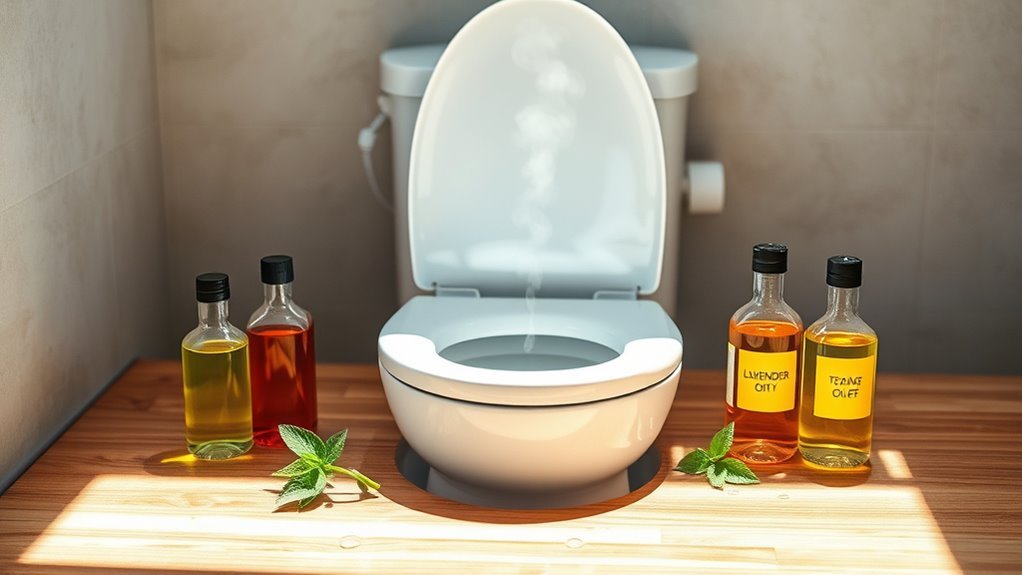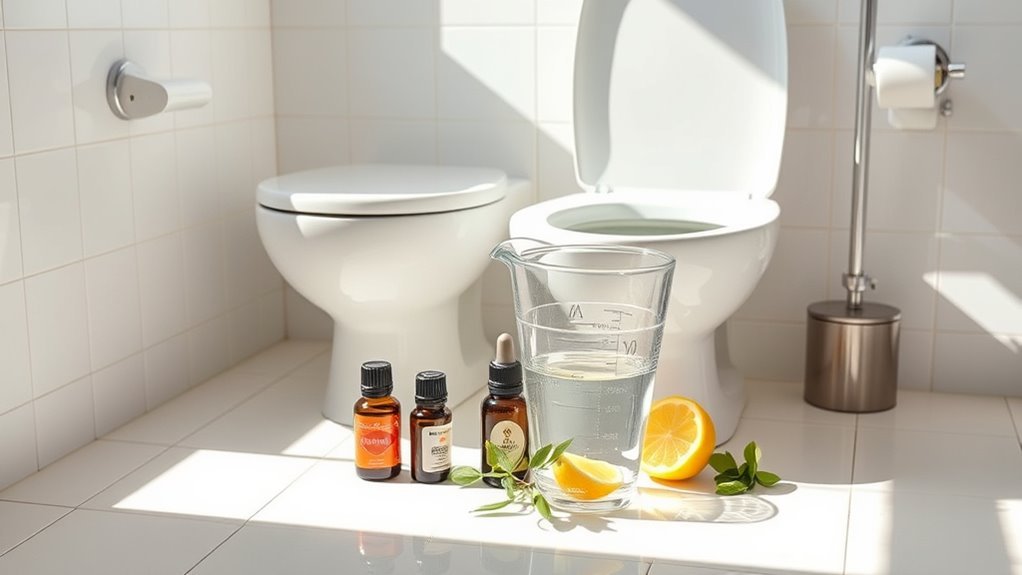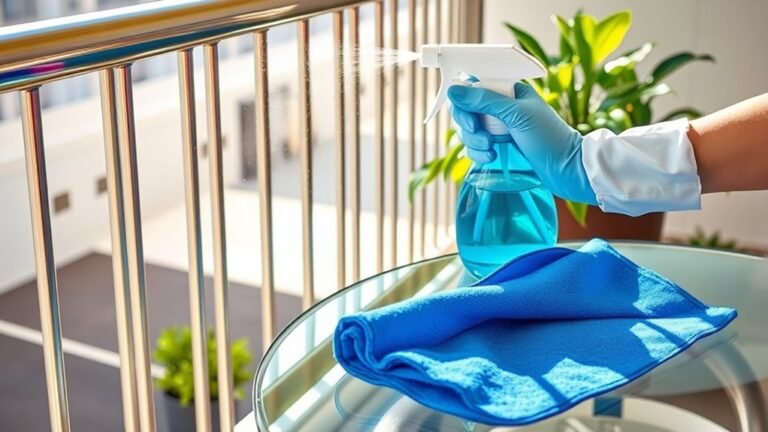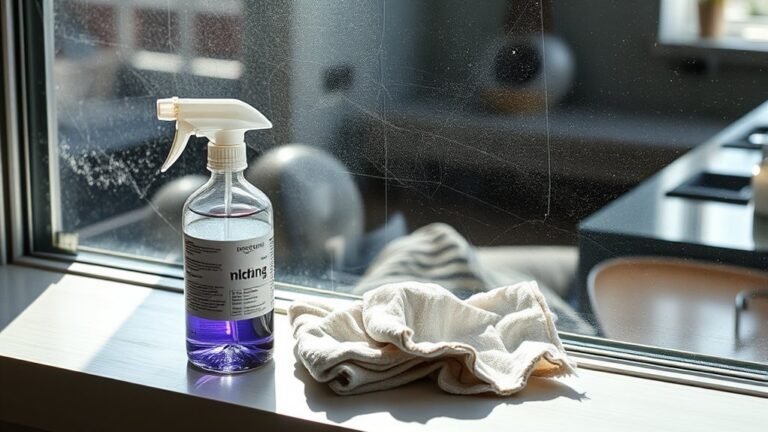Using Essential Oils to Clean Toilet
You can clean your toilet naturally by using essential oils like tea tree or lavender, which kill germs and leave a fresh scent without harsh chemicals. Mix baking soda with white vinegar and 20 drops of essential oil to create a powerful, eco-friendly cleaner. Pour it around the bowl, let it sit, then scrub and flush for a fresh, spotless toilet. If you want tips on prep, safety, and maintenance, there’s more to discover to make your routine even better.
Benefits of Using Essential Oils for Toilet Cleaning

Although traditional cleaners can be effective, using essential oils for toilet cleaning offers unique benefits you might not have considered. When you do an effectiveness comparison, essential oils stand out not only for their cleaning power but also for their natural antibacterial properties and invigorating scents. User testimonials frequently mention feeling liberated from harsh chemicals and lingering synthetic odors, making the cleaning experience more pleasant and less toxic. You’ll appreciate how these oils cut through grime while leaving a fresh, calming aroma that traditional products lack. Plus, essential oils give you control over what goes into your home, aligning with your desire for freedom from harmful substances. Choosing essential oils means you’re embracing a cleaner, safer, and more enjoyable way to maintain your toilet.
Top Essential Oils for Toilet Cleaning
When it comes to tackling toilet cleaning with essential oils, some stand out for their powerful antibacterial and deodorizing properties. Lavender oil is a top choice, offering a fresh, calming scent while naturally combating germs. It’s perfect if you want a clean toilet without harsh chemicals. Tea tree oil is another superstar; its strong antimicrobial effects help eliminate stubborn bacteria and mildew, keeping your toilet hygienic and fresh. Both oils bring you the freedom to clean effectively while enjoying natural fragrances. You can also combine them for a balanced blend of freshness and disinfecting power. Choosing these essential oils means you’re taking control of your cleaning routine, making it safer, more enjoyable, and eco-friendly.
How to Prepare an Essential Oil Toilet Cleaner

Creating your own essential oil toilet cleaner is simpler than you might think. With just a few ingredients and your favorite essential oil blends, you can craft a powerful, natural cleaner that frees you from harsh chemicals. Here’s a quick look at basic DIY recipes to get you started:
| Ingredient | Purpose |
|---|---|
| Baking Soda (1 cup) | Scrubbing and deodorizing |
| White Vinegar (1 cup) | Disinfecting and dissolving stains |
| Essential Oil Blend (20 drops) | Adds antibacterial properties and fresh scent |
Combine baking soda and essential oils first, then slowly add vinegar to activate fizzing. This mixture not only cleans but also leaves your toilet smelling fresh, giving you freedom from synthetic cleaners and a fresh start each time you clean.
Step-By-Step Guide to Cleaning Your Toilet With Essential Oils
To clean your toilet effectively with essential oils, you’ll need just a few simple steps that make the process quick and natural. First, pour your prepared essential oil toilet cleaner around the bowl, focusing on stains and under the rim. Let it sit for about 10 minutes; this allows the oils to break down grime and kill bacteria. Next, scrub thoroughly with a toilet brush, reaching every corner. Flush to rinse away loosened dirt and the cleaner. For the seat and exterior, mix a few drops of your favorite essential oil with water in a spray bottle, then wipe down with a cloth. This step refreshes and disinfects without harsh chemicals. Following this routine gives you a clean toilet with the freedom of using natural, effective essential oil cleaning.
Tips for Maintaining a Fresh-Smelling Toilet Naturally

To keep your toilet smelling fresh every day, try making a simple essential oil spray you can spritz after each use. You can also use natural deodorizing techniques like placing cotton balls soaked in oils near the toilet or adding baking soda with a few drops of your favorite scent. These small habits make a big difference without harsh chemicals.
Daily Essential Oil Sprays
A few sprays of essential oil each day can keep your toilet smelling fresh without harsh chemicals. Using daily spray recipes with essential oil blends lets you enjoy a clean, inviting bathroom effortlessly. Choose blends like lavender and eucalyptus for calm, or citrus and peppermint for energy, matching your mood or desire for freedom from synthetic scents.
| Blend Type | Mood Boost | Benefits |
|---|---|---|
| Lavender + Chamomile | Relaxation | Calms, soothes |
| Lemon + Peppermint | Refreshment | Energizes, deodorizes |
| Eucalyptus + Tea Tree | Clarity | Cleanses, purifies |
Spritz your chosen blend daily around the toilet area. This simple ritual frees you from chemical cleaners and keeps your space naturally fresh.
Natural Deodorizing Techniques
Keeping your toilet smelling fresh goes beyond just daily sprays. You can embrace natural deodorizing techniques that not only add a pleasant natural scent but also support air purification. Try placing a small bowl of baking soda mixed with a few drops of your favorite essential oil, like eucalyptus or lemon, near the toilet. This simple combo absorbs odors while releasing a subtle, clean fragrance. Another great trick is to use activated charcoal sachets—they’re fantastic at trapping unwanted smells and improving air quality. Ventilation matters too; whenever possible, open a window or use an exhaust fan to keep air circulating freely. By choosing these natural methods, you’re freeing yourself from harsh chemicals and creating a fresh, inviting bathroom environment without compromising your well-being.
Safety Precautions When Using Essential Oils in the Bathroom
When using essential oils in your bathroom, it’s vital to dilute them properly to avoid skin irritation. You’ll also want to handle them carefully since direct contact can cause reactions. Make sure the room is well-ventilated to keep the air fresh and safe while cleaning.
Dilution Importance
Since essential oils are highly concentrated, you’ll need to dilute them properly before using them in your bathroom cleaning routine. This guarantees safety and effectiveness while respecting the essential oil concentration. Using correct dilution ratios prevents overpowering scents and reduces risks. Here’s a quick guide to help you balance potency and safety:
| Use Case | Dilution Ratio |
|---|---|
| General Cleaning | 10-15 drops per cup water |
| Heavy Duty Cleaning | 15-20 drops per cup water |
| Air Freshening | 5-10 drops per cup water |
Stick to these dilution ratios to keep your bathroom fresh and safe. Proper dilution lets you enjoy the freedom of natural cleaning without worry, making your essential oil experience both powerful and pleasant.
Skin Contact Risks
Proper dilution is just one part of using essential oils safely in your bathroom. You need to be mindful of skin contact risks to avoid skin irritation or allergic reactions. Essential oils are potent, and direct exposure can cause redness, itching, or more severe reactions, especially if your skin is sensitive. Always wear gloves when applying oils around the toilet or bathroom surfaces. If you accidentally get oils on your skin, wash the area immediately with soap and water. It’s smart to do a patch test before using any new oil to check for allergic reactions. Taking these steps lets you enjoy the freedom of natural cleaning without compromising your skin’s health or comfort. Stay cautious, and your bathroom routine will remain safe and effective.
Proper Ventilation Needed
Although essential oils offer natural cleaning benefits, you shouldn’t overlook the need for good ventilation in your bathroom. Proper airflow considerations guarantee that the potent aromas don’t overwhelm your space, keeping the air fresh and safe. Ventilation systems like exhaust fans or open windows help disperse the essential oil vapors, preventing respiratory irritation and maintaining your freedom to breathe easy.
| Ventilation Tip | Why It Matters |
|---|---|
| Use exhaust fans | Removes strong scents quickly |
| Open windows | Enhances natural airflow |
| Limit oil quantity | Prevents overpowering smell |
| Avoid closed spaces | Reduces vapor concentration |
| Regular maintenance | Keeps ventilation effective |
Eco-Friendly Alternatives to Conventional Toilet Cleaners
When you’re looking to keep your toilet clean without harsh chemicals, eco-friendly alternatives offer a safer and more natural solution. By choosing eco friendly products, you embrace sustainable cleaning that protects your health and the planet. You don’t have to sacrifice cleanliness for freedom from toxins.
Eco-friendly toilet cleaning offers a natural, safe way to keep your home fresh without harmful chemicals.
Consider these options for a greener routine:
- Baking soda and vinegar for natural scrubbing and deodorizing
- Essential oils like tea tree or lavender for antibacterial power
- Castile soap as a gentle, plant-based cleaner
- Reusable toilet brushes with bamboo handles
- Homemade cleaning sprays using lemon juice and water
Frequently Asked Questions
Can Essential Oils Damage Toilet Plumbing or Seals?
You might wonder if essential oils could harm your toilet’s plumbing or seals. Generally, they’re safe when used in small amounts, but overdoing it can affect toilet maintenance and plumbing safety. Some oils are acidic or oily, which might degrade rubber seals over time. To keep your freedom from plumbing issues, use diluted oils sparingly and always check compatibility with your toilet parts to avoid costly repairs.
How Often Should I Clean the Toilet With Essential Oils?
Wondering how often you should tackle that toilet cleaning? The frequency recommendations usually suggest once a week to keep things fresh and hygienic. But it really depends on your lifestyle and usage. If you crave freedom from harsh chemicals, incorporating essential oils into your cleaning routines can make this chore more enjoyable. Just stick to your schedule, and you’ll maintain a sparkling toilet without feeling tied down by constant scrubbing.
Can Essential Oils Help Remove Hard Water Stains?
You can definitely use essential oils to help with hard water stain removal. Oils like lemon or tea tree have natural cleansing properties that break down mineral buildup, making those stubborn stains easier to tackle. While they might not completely replace stronger cleaners, combining them with vinegar or baking soda gives you a natural, effective way to keep your space fresh and free from hard water marks — all while enjoying the freedom of using safer, eco-friendly products.
Are Essential Oils Safe to Use Around Pets in the Bathroom?
They say, “Better safe than sorry,” and when it comes to essential oil safety around pets, that’s spot on. You’ve got to remember, many oils can be harmful if your furry friends inhale or ingest them. To protect pet health, use oils in well-ventilated areas and avoid direct contact. If you want freedom in your cleaning routine, choose pet-safe oils like lavender or chamomile, and always keep your pets’ well-being front and center.
Can I Mix Essential Oils With Bleach or Other Cleaners?
You shouldn’t mix essential oils with bleach or other cleaners because essential oils compatibility with these products can cause dangerous chemical reactions. Cleaning product interactions might release harmful fumes or reduce effectiveness. To keep your freedom to clean safely, use essential oils separately in diffusers or diluted with water. This way, you avoid risks and still enjoy their natural benefits without compromising your health or safety.






